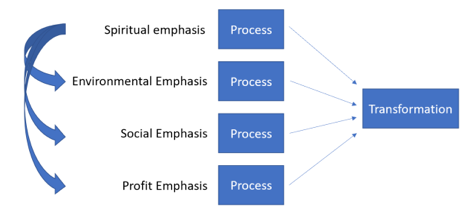
Part 2 of a mini two part series.
Last week we discussed why optimization is a more important term than maximization in the B4T realm. Ironically, the more you try to maximize any one input, the less maximized the output will be (and, indeed, the whole system may blow up). Therefore, we focus on optimizing each input to get an “optimal” output > transformation. One key to this is that “spiritual” is not the end goal of B4T; transformation is. Transformation most definitely involves spiritual fruit, but it involves the other three dimensions listed as well. Today we will discuss the other major key, and it is closely linked to this one.
I have arrows flowing from “spiritual” to “environmental,” “social,” and “profit.” The reason I do this is that I am deliberately creating a bridge from a secular-sacred divide mindset into one that is purely sacred. The way Westerners think isn’t all bad. There is a reason we tend to separate things out into boxes. This way we can break things down into their essential components and understand each better. Indeed, many great inventions come from this line of reasoning.
However, when it comes to spiritual things, we apply the same thought process and after we have distilled every aspect to its core, we forget that they are all originally spiritual in nature. We then have things like, “The Bible is sacred,” and “taking care of the environment is secular.” “Praying is sacred,” and “making a profit or an impact on society is secular.”
The major bust here is that we read in the Bible how God tells us to subdue (not destroy) the environment, and we are told to pray continually and for a wide variety of things, yet by bucketing profit into a secular category, we think praying for it is wrong. We have lost our way.
Praying that God would bless us to bless others is a thoroughly biblical concept. We are meant to be a pipeline of God’s blessings. Blessings come through us, but they flow past us; we are not the endpoint of the system. In our businesses, then, we are fully within the spiritual realm to beg our Heavenly Father to bless our business, create wealth for our employees and their families, enrich the surrounding community with His common grace, bring as many people to faith in Christ as are called, and to honor His beautiful creation in the process.
Why must we separate these things out and claim that one is superior to the others? In a Western Christian way of thinking, yes – “spiritual” is the most important because eternity is involved. But in a more holistic way of thinking, the other three are also spiritual and will aid in spiritual transformation because it creates a fuller picture of how God intends life to be lived on the earth. This is why Jesus taught many of His parables with a workplace setting; He taught about vineyards and farms and salaries, because this is life!
Without Jesus there is no transformation; no BAM, no B4T. There may be change. There may even be good things happening. But no Jesus, no transformation.
So, as it is helpful to separate things into categories to help us understand similarities and differences and to develop strategies to optimize our use of resources in each area, it seems to be a better practice to realize the other three roll up into the spiritual dimension as the ultimate goal of transforming society is glorifying and exalting Jesus.
![]()
PATRICK LAI and his family have worked in SE Asia for over 37 years. His experience in doing business with Jesus has brought him to understand the meaning of work and worship in the marketplace. He started 14 businesses in four countries, six of which are still operating. Patrick and his wife, May, mentor and coach businesspeople working where there are few or no Christians. Check out Patrick’s latest book, Workship, now available in paperback and e-book.
- Blog Home
- /
- Transformation
- /
- OPTIMIZATION IS KEY IN...
